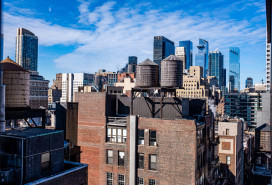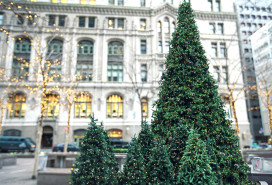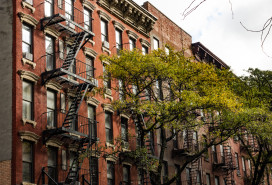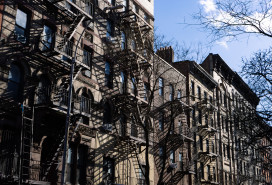3 downsides of owning a washer and dryer in a NYC apartment

If you haven’t had your own laundry machines before, you may be surprised by just how much maintenance is required.
iStock
Congrats! You landed an apartment with an amenity coveted by many New York City renters: Your very own washer and dryer! Cue The Jeffersons’ theme song and do a happy dance, because you won’t be hanging out in a basement laundry room or hauling your stuff to the laundromat anymore.
But hang on a minute—just because these are cleaning appliances doesn’t mean they clean themselves. In fact, if you haven’t had your own laundry machines before, you may be surprised by just how much maintenance is required.
Read on to know what you need to do to stay on top of your own washer and dryer.
1) The lint trap needs to be cleaned—every time
A few days ago, my nearly 80-year-old father called me to tell me he vacuumed a football-size ball of lint out of the duct that leads from his dryer to the vent in the side of his house. Dryer lint is highly flammable, so this is definitely something you want to avoid. (“Umm, great news, Dad?!”) In his defense, to get that much lint probably took decades.
Still, you don’t want to take chances. Get in the habit of cleaning the lint trap in the door every time you run a load in the dryer.
And, every year or two (more if you notice your clothes are taking longer than usual to dry) either you (or your landlord if you rent) will need to have the exhaust vent vacuumed out. There are dryer lint removal companies you can hire—and you can band together with other apartments to have your whole building done at the same time. When I lived in a self-managed condo–we did this once every other year or so on a Saturday morning.
Longer ducts with bends can create areas for lint build-up so if your appliance vents to the outside, this is something to have checked. A dryer inspection typically costs under $100; cleaning will be an additional cost. Sometimes lint can harden or get wet from condensation. One solution is to add a fan at the midpoint or an exhaust fan at the end. You can also have a thin section of the duct cut out and a second, removable lint trap added to catch more build up.
Many newer machines will automatically shut down in the event of a fire, and fortunately, while fire is a concern, they are rare occurrences, says Jeff Schneider, president of Gotham Brokerage, which specializes in apartment insurance in New York City (and is a Brick sponsor).
2) Flooding is a concern
A drain pan underneath your washing machine is crucial to preventing the overflows from a broken hose, which can cause gallons of water to spill—and create a very expensive mess. These are inexpensive and relatively easy for a professional to install (or you, if you’re feeling handy). They are especially necessary if you live above another renters, which is invariably the case in a NYC apartment.
If you don’t have one, you’re probably googling it now, and wondering how this flat pan with a one- or two-inch lip can do much to prevent a flood. It’s simple: Drain pans work because they are connected to a drain pipe—in some case you may need to hire a plumber to make a connection to a drain pipe.
Some other tips for preventing mishaps are not to run either appliance while you are out of your apartment (or while you’re asleep) so you can spring into action and shut off water or reach for a fire extinguisher in a worst-case scenario.
“We do see overflows from washers and broken hose connections," Schneider says. "Stainless steel braided hose is much better. The damage to your apartment and the apartments below is covered, but it’s much better to avoid the aggravations from the start.”
3) Mold is your enemy
The newest washing machines are typically front loaders—that’s because they’re designed to wash clothes more efficiently. They’re more effective because their drums rotate on their side—that means you don’t need to fill them with as much water as a top loader in order to spin your clothes through the water.
But these machines require a heavy rubber gasket on the door to prevent leaks—and the folds of the gasket are a prime place for dirt and soap scum to get trapped and create a breeding ground for bad-smelling mold.
Make it a habit to leave the door to the washing machine open after every wash to improve air circulation and dry out the machine (if you have a light in your machine, it will shut off after a few minutes). Another good tip is use dampen a cloth lightly with white vinegar and wipe the gasket—doing this once or twice a month can combat mildew and keep the stink away.
You Might Also Like


























